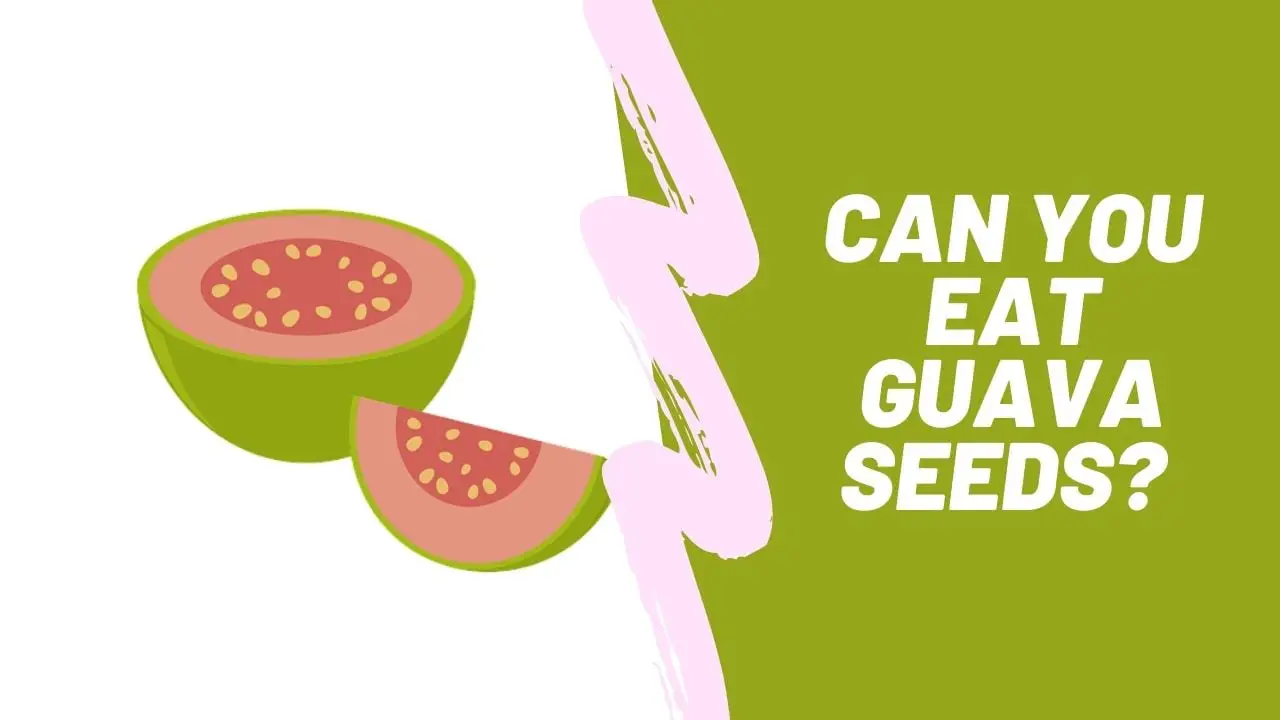If you’re chewing on the grittier guava flesh and discarding the hard yellow seeds that pattern the mushy core, stop right there because you’re definitely doing it wrong.
All parts of the guava fruit from the bumpy skin to the rigid seeds that surrounds the gelatinous pulp in the middle are edible, having lots of potential benefits for the human body.
Below, we look at some of the nutritional benefits that comes with incorporating guavas into your diets and to conclude, we outline brilliant tips and ideas on how to properly enjoy guava seeds at home or in the office. Oh, and also how not to eat guava seeds because there’s definitely a habit that can skew the rights of the practice to a wrong!
Nutritional benefits of eating guava fruits including the seeds
Guavas pack a punch when it comes to aromatics and flavor notes, but they’re also known to represent well in the nutritional department.
The less than 10 cm round shaped berries pack a healthy collection of vitamins and minerals that can build up the body and protect it against harmful complications. Here are some of the ways eating guava can improve the quality of your life.
1) Eating guavas before a meal may improve the health of your heart.
There’s a study that says laughing is good for the heart because it relieves stress and gives boost to the immune system. Guess another thing can help you achieve a healthy state of heart without turning yourself into a laughing kookaburra? Eating guavas of course!
Studies in 120 people have shown that eating ripe guavas before meals lead to an overall decrease in blood pressure by a few points and also a small increase and reduction in good and bad cholesterol levels respectively. This is in part, thanks to the high levels of potassium and soluble fiber present in the guava seeds.
2) Digestive system
If you suffer from bad bowel movement and constipation, guavas are one of the natural remedies you can try as the soluble fibers in them which constitute roughly 12% of the daily intake fiber, may help with good bowel movement and prevent constipation.
3) Guava snacks support weight loss
Guavas are so against weight gain because of their low calorific content. They weigh only a measly 37 calories on the energy scale, so pouncing on them every so often shouldn’t distort your weight loss efforts. Plus the nutrients sealed within those thin to thick sized rinds would definitely ensure that you don’t miss out on anything major.
4) Guavas can give your skin that glossy essence you’ve always longed for
Guavas are no miracle cleansers or acne treatments, guava leaves could actually be though. Eating them in copious amounts for the primary sake of treating acne won’t work, especially when you’re not following an acne regimen yet. Or, at least, the p.bacterias on your skin are too wise be fooled in such manner.
But there’s another different way that guavas can benefit your skin’s health. It’s through their wide range of vitamins (especially Vitamnin C) and antioxidants which offer protection for the skin, improve wrinkles, and also slows down aging — i can already hear the mommas in the room screaming “YES” at the top of their lungs!
If you’re good with having acne on a wrinkle free face, then hurray, eat guavas as regularly as you’d like but bear in mind that too much of everything is bad though. If you’re not, then there’s a way out. Opt for a professional skin care routine (alongside eating guavas) for a perfectly glowing skin!
Outside these three benefits, there also numerous other benefits of guavas that science has discovered, but discussing each one of them in this article would defeat its purpose. So for a quick wrap, here are other important benefits of guavas that science have understood.
- Guavas may help boost immunity
How to eat guava seeds
Now that you understand guava seeds are edible, and perhaps you’ve checked in on how to identify ripen guavas from immature ones, it’s time to learn how to properly dig into the complex mass of flavor packed within the berry.
Here are the different ways to do it.
Directly with the fruit: There’s no better way of consuming guava seeds than from the fruit itself. The next time you get you some ripe succulent guava, ditch scoping out the seeds and go full force with a bite that explores the musky and fruity notes alongside the crispness from the seed’s part. You may choose to swallow them whole, or grind the seeds properly before swallowing, your choice. For children, it’s best to scoop out the seeds and let them chomp on the remaining flesh.
Topping: Guavas are an excellent addition to ice creams, yoghurts or even on salad dressings. They add than nice crunchy kick.
Blend into fruit juice: Guavas alongside their seeds can readily be made into smoothies or juice by blending. Feel free to throw in slices of guavas with their seeds and try out whatever combination or recipe that works best for you or the kids.
How not to eat guava seeds
Isolated, alone and on an empty stomach. Guava seeds should never be eaten alone for the reasons that “it’s just never done that way” and also for the risks of their complications. You don’t want too much potassium and protein going into your body.
Eating guava fruits on an empty stomach, too, just like bananas and many other fruits is a big no no. Your body needs some food beforehand in order properly digest the guavas and reap the benefits of the nutrients. At this point, it is important to clear the air about guavas and appendicitis.
The notion that guava seeds lead to appendicitis is nothing but a bizzare myth!
How to eat guava without seeds
If you’re the type that just never happens to like guava seeds no matter how much of their nutritional benefits are advertise, then you can scoop out the middle with a spoon and enjoy the remaining portion of the fruit, or avoid wastage by ditching regular guava fruits and going for the seedless varieties when they’re available.
You can also by the regular guava fruits but repurpose their seeds in smoothies, or topping for anyone at home that likes them. Another thing you can do with guava seeds is to plant them if you have interest in gardening. Guava seed counts are normally 112 to 535 within the pulp and they are typically boiled for 5 minutes or soaked in water for up to weeks to break seed dormancy. Next, they are planted in a nursery pot and transferred outside when they’ve germinated.

